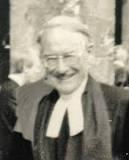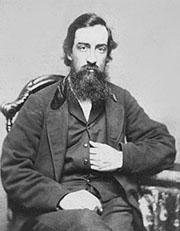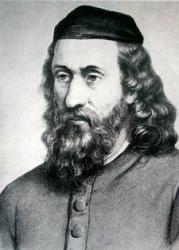Planning worship?
Check out our sister site, ZeteoSearch.org,
for 20+ additional resources related to your search.
- |
User Links
Person Results
William Croft

1678 - 1727 Scripture: Romans 14:17 Composer of "HANOVER" in The Worshiping Church William Croft, Mus. Doc. was born in the year 1677 and received his musical education in the Chapel Royal, under Dr. Blow. In 1700 he was admitted a Gentleman Extraordinary of the Chapel Boyd; and in 1707, upon the decease of Jeremiah Clarke, he was appointed joint organist with his mentor, Dr. Blow. In 1709 he was elected organist of Westminster Abbey. This amiable man and excellent musician died in 1727, in the fiftieth year of his age. A very large number of Dr. Croft's compositions remain still in manuscript.
Cathedral chants of the XVI, XVII & XVIII centuries, ed. by Edward F. Rimbault, London: D. Almaine & Co., 1844
William Croft
Alan Gray
1855 - 1935 Person Name: A. Gray (1855-1935) Scripture: Romans 14:17 Composer (descant) of "HANOVER" in Hymns for Today's Church (2nd ed.) Born: December 23, 1855, York, England.
Died: September 27, 1935, Cambridge, England.
Buried: Trinity College, Cambridge, England.
Alan Gray (23 December 1855, York – 27 September 1935, Cambridge) was a British organist and composer.
Born in York, he attended St Peter's School in York and Trinity College, Cambridge. From 1883 until 1893 he was Director of Music at Wellington College. In 1893 he returned to Cambridge to be organist at Trinity College, and remained organist there until 1930.
Among his compositions are liturgical music for Morning and Evening Prayer and the Office of Holy Communion for use in the Church of England according to the Book of Common Prayer, including an Evening Service in f minor, a setting of Holy Communion in G, several anthems, including 'What are these that glow from afar?', and a collection of descants to various hymn tunes, several of which are still in use today (Common Praise (2000) includes four). He also composed a number of items for organ, for violin solo, and for voice and orchestra to religious and secular texts.
--en.wikipedia.org/wiki/
Alan Gray
Gerald L. Barnes
b. 1935 Person Name: Gerald L. Barnes, b. 1935 Scripture: Romans 14:17 Composer of "TETHERDOWN" in Singing the Faith
Gerald L. Barnes
David Peacock
b. 1949 Person Name: David Peacock, b. 1949 Scripture: Romans 14:11 Arranger of "[Come, now is the time to worship]" in Singing the Faith
David Peacock
Robert C. Trupia
b. 1948 Person Name: Robert C. Trupia, siglo XX Scripture: Romans 14:7-8 Translator of "Resucitó" in Oramos Cantando = We Pray In Song
Robert C. Trupia
George Bradford Caird

1917 - 1984 Person Name: George B. Caird Scripture: Romans 14:13 Author of "Almighty Father, Who for Us Thy Son Didst Give" in Rejoice in the Lord George Bradford Caird (17 July 1917 – 21 April 1984), D.Phil., D.D., FBA, was a British churchman, theologian, humanitarian, and biblical scholar. At the time of his death he was Dean Ireland's Professor of the Exegesis of Holy Scripture at the University of Oxford.
Born in London, England to parents from Dundee, Scotland, George Caird's early years were spent in Birmingham, England, where his father was a construction engineer, and where he attended King Edward's School. His university education began at Peterhouse, Cambridge, where he received the B.A. in 1939, First-Class Honours in both parts of the Classical Tripos, with distinction in Greek and Latin verse. A lifelong Congregationalist, he then left Cambridge to study theology at Mansfield College, Oxford, and acquired the Oxford M.A., First-Class Honours, in 1943. In 1944 he was granted the Oxford D.Phil. for his thesis "The New Testament Conception of Doxa (Glory)".
After serving three years as a pastor in Highgate, London, in 1946 Caird and his young bride, Viola Mary Newport, known to all as "Mollie," pulled up stakes and left for Canada. Virtually fluent in ancient Hebrew, there he was quickly made Professor of Old Testament at St. Stephen's College, Edmonton, Alberta, and later (simultaneously) Professor of New Testament at McGill University and Principal of the United Theological College of Montreal.
In 1959 Caird returned to Oxford and the Congregationalist stronghold of Mansfield College, where he was first Senior Tutor (under John Marsh) and later Principal (1970–1977). Because he was non-Church of England, and because Mansfield was still a Permanent Private Hall and had not yet achieved status as a constituent College of the University (see Colleges of the University of Oxford) during this period (1969–1977), Caird was barred from holding an official university lectureship. However, as a compensation he was granted the honorary position of Reader (academic rank) in Biblical Studies, a status somewhere between Senior Lecturer and Professor. And whenever he lectured on the New Testament at Mansfield, students from all over the university came and filled the large lecture hall to capacity. According to Henry Chadwick, "He lectured as he preached, almost always without a note . . . with nothing before him but a Greek New Testament, usually upside down, for he knew the text by heart". In 1975-1976 Caird took on almost full-time administration, serving as Moderator of the United Reformed Church, and during his tenure he visited South Africa. His work in the fields of Old and New Testament (he remains one of the few modern biblical interpreters to have held chairs in both) led to four honorary doctorates (including the Oxford D.D.), election to the British Academy (and the granting of its Burkitt Medal for Biblical Studies), and appointment to be the Dean Ireland's Professor and Professorial Fellow at The Queen's College, Oxford.
In 1980 he won the Collins Religious Book Award for his work The Language and Imagery of the Bible. His final years involved biblical translation as a member of the translation panel of The Revised English Bible, as previously he had been a translator of The New English Bible's Apocrypha. He also co-edited (with Henry Chadwick ) Oxford's The Journal of Theological Studies from 1977-1984. In his lifetime he wrote nearly sixty articles, over a hundred book reviews, and six books. Following his resignation as Principal of Mansfield and his taking up of the Dean Ireland's chair, the Cairds left Oxford and moved into the sixteenth century thatched-roof "Brook Cottage" at Letcombe Regis, next to Wantage, Oxfordshire, seventeen miles southwest of Oxford. There they converted the cottage's back storeroom into "the Dusty" - a study for Caird to write in during his imminent retirement; it was there that he was working on his seventh major work, New Testament Theology, when he was felled by a heart attack on Easter Eve, 1984. His funeral was held in Mansfield College Chapel on 28 April, with Principal Donald Sykes delivering the eulogy; a memorial celebration was later conducted (13 October) in Great St. Mary's Church, Oxford, with his close friend Henry Chadwick delivering the address. A Festschrift was at the time in the works, which was subsequently converted into a memorial volume, The Glory of Christ in the New Testament: Studies in Christology in Memory of George Bradford Caird, edited by two of his students, Lincoln Hurst (L. D. Hurst) and Tom Wright (N. T. Wright), and published by Oxford University Press in late 1987. Shortly after his death, some quick decisions needed to be made, particularly that involving his half-completed New Testament Theology; accordingly, Hurst was appointed Caird's Literary Executor. In addition, his children (see below) set up a foundation, The G. B. Caird Memorial Trust, the proceeds from which might enable (successfully, as it turned out) a new senior position to be set up in his name at Mansfield College: the G. B. Caird Fellow in New Testament Theology. It is currently occupied by Dr. John Muddiman. Caird's academic legacy is also seen in that during the course of his career he taught numerous people who went on to garner serious scholarly attention. These include Marcus Borg, Colin Gunton, Lincoln Hurst, David P. Moessner, John Muddiman, Allison Trites, Francis Watson, and N. T. Wright. According to British Old Testament scholar James Barr, Caird was sometimes "practically adored" by students.
While to some Caird could appear austere, even intimidating, "he was in fact full of fun and humour". In his leisure time he enjoyed (most famously) bird-watching, croquet, snooker, music, theatre, reading mysteries, ping pong, chess, and all forms of puzzles — especially the crossword and jigsaw variety. Music in particular occupied his time: it "was important to him, and he wrote several hymns, some of which were included within standard hymnals such as Congregational Praise and Hymns Ancient and Modern". He and Mollie had four children: James, Margaret (Meg) Laing, John, and George (Geordie). To Caird the home was never just a house: it was a bastion of the family - a center of games, poetry, music, and other cultural activity, where he was, according to Henry Chadwick, "sublimely happy . . . it was a microcosm of vigorous debate and breathtaking wit, sparkling with his wife and his three sons and his daughter, whose gifts were a source of deep joy for him. From Mollie he caught his love for bird-watching, and from his children he loved to learn about architecture [James], drama [John], music [Geordie], and medieval philology [Meg]". Also, "no picture of George would be right which omitted his intense affection for his grandchildren."
--en.wikipedia.org/wiki/ (excerpts)
George Bradford Caird
Juanita R. de Balloch
1894 - 1959 Person Name: J. R. de Balloch Scripture: Romans 14:7 Translator of "Oh, Ruégote, Señor, Me Enseñes" in Himnario Bautista Born: 1894, Spain.
Juanita R. de Balloch
Communauté de Taizé
Person Name: Taizé Community Scripture: Romans 14:17 Author of "The Kingdom of God" in More Voices
Communauté de Taizé
Joseph Smith, III

1832 - 1914 Person Name: Joseph Smith, 1832-1914 Scripture: Romans 14:19 Author of "Lord, let thy blessing rest in peace" in The Hymnal
Joseph Smith, III
Jan Roh

1487 - 1547 Person Name: Johann Horn, 1490-1547 Scripture: Romans 14:19 Composer of "AVE VIRGO VIRGINUM" in The Covenant Hymnal Pseudonyms--
Johann Cornu
Johann Horn
John Horn
Roh, Johann, was a native of Domascbitz near Leitmeritz, in Bohemia. Roh was his name in Bohemian, but when he wrote in Latin he styled himself Cornu, and in German Horn. In 1518 he was ordained priest and appointed preacher to the Bohemian Brethren's community at Jungbunzlau, in Bohemia. At the Synod of Brandeis, in Sep. 1529, he was chosen as one of the three Seniors of the Unity. Finally, at the Synod of Brandeis, in April 1532, he was appointed Bishop, and held this post till his death, at Jungbunzlau, Feb. 11, 1547. (Koch, ii. 114; Wackernagel, i. p. 727, &c.)
Roh was the editor of the Bohemian Hymn Book of 1541, and is said to have written a number of hymns in the Bohemian language, but the edition of 1561 only gives one with his name. He also edited the second German hymn-book of the Brethren, viz., Ein Gesangbuch der Brüder inn Behemen und Merherrn, Nürnberg, 1544; and seems to have been author or translator of all, or nearly all, of the 32 hymns there added. Another hymn ("O heiliger Vater, glitiger Herr") is also given with his name in the Kirchengeseng, 1566. A considerable number of Ron's hymns passed into the Lutheran hymn-books of the 16th and 17th centuries, and into the Moravian Hymn Books of the 18th cent. Rather curiously in the last Moravian Hymn Books, (the Kleines Gesangbuch, Gnadau, 1870), his name is not found in the list of authors.
Those of Roh's hymns which have been translated into English are:—
i. Gottes Sohn ist kommen. Christmas. In 1544, as above, and thence in Wackernagel iii. p, 350, in 9 stanzas of 6 lines, The heading "Ave Hierarchia" refers to the melody, for it is not a translation from the Latin. Included in V. Babst's Gesang-Buch, Leipzig, 1553, and recently in the Unverfälschter Liedersegen, 1851, No. 6, Strangely enough this fine hymn was omitted from the Kirchengeseng of 1566 and later editions; and though it was included in the Herrnhut Gesang-Buch, 1735, and the Brüder Gesang-Buch, 1778, it has again been omitted from the Kleines Gesang-Buch, 1870. The translations are:—
1. Lo! from highest heaven. A free translation of stanzas i.-iii., vi., by A. T. Russell, as No. 27 in his Psalms & Hymns, 1851. Included, altered, in Kennedy, 1863.
2. Once He came in blessing. A good translation of stanzas i.-iii., v., ix., by Miss Winkworth, in her Chorale Book for England, 1863, No. 26. Included in J. Robinson's Collection, 1869, and the Pennsylvania Lutheran Church Book, 1868.
3. God's Son once descending. This is No. 249 in pt. i. of the Moravian Hymn Book, 1754.
Hymns not in English common use:—
ii. Betrachtn wir heut zu dieser Frist. Easter. 1544 as above, and in Wackernagel, iii. p. 359, in 14 stanzas of 3 lines. Translated as:—(1) "The Saviour Jesus, Friend of Man." As No. 332 in pt. i. of the Moravian Hymn Book, 1754. This is from the recast "Der selge Heiland, Jesus Christ" (based on ii.-v.), as No. 1875 in Appendix xii. c. 1745, to the Herrnhut Gesang-Buch 1735.
iii. Ein starker Held ist uns kommen. Christmas. 1544 as above, and in Wackernagel, iii. p. 352, in 12 stanzas of 4 lines. Translated as (1) "God took our nature upon Him (stanza iii.), as No. 251 in pt. i. of the Moravian Hymn Book, 1754.
iv. Lob Gott getrost mit singen. Christian Church. 1544 as above, and in Wackernagel, iii. p. 360, in 9 stanzas of 8 lines. In the Kirchengeseng, 1566, two st. were inserted between iii. and iv. This form, in 11 stanzas, is No. 563 in the Unverfälschter Liedersegen 1851. In the Brüder Gesang-Buch 1778, No. 1014, is a cento in 3 st. (from st. vi., viii., ix. of the 1544, and iv. of the 1566), beginning "Lass dich durch nichts erschrecken," and this form has been translated as "O be not thou dismayed, Believing little band," as No. 596 in the Moravian Hymn Book, 1886.
v. O Mensch, thu heut hören. Passiontide. 1544 as above, and in Wackernagel, iii., p. 355, in 20 stanzas of 4 lines. The English version is "I am thy Lord and God" (st. ii.), as No. 258, in pt. i. of the Moravian Hymn Book, 1754. [Rev. James Mearns, M.A.]
--John Julian, Dictionary of Hymnology (1907)
Jan Roh


 My Starred Hymns
My Starred Hymns


